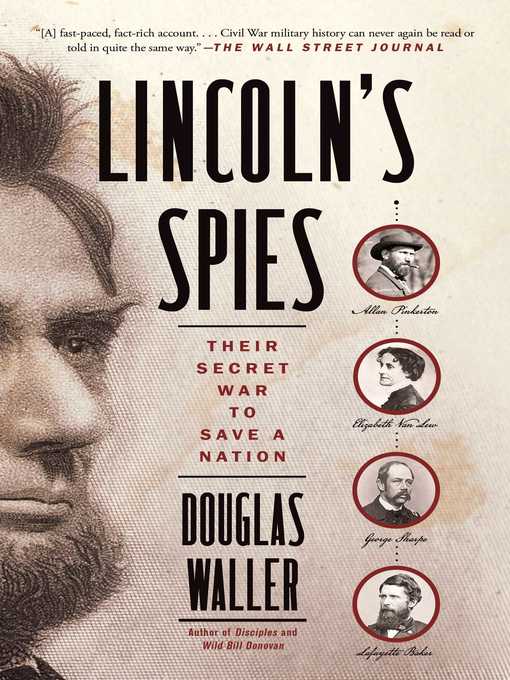
Lincoln's Spies
Their Secret War to Save a Nation
کتاب های مرتبط
- اطلاعات
- نقد و بررسی
- دیدگاه کاربران
نقد و بررسی

June 1, 2019
Waller (Disciples) delivers a highly readable and detailed accounting of spies and spycraft during the Civil War, encompassing a wide network of spying, and of varied spies who used their wit to obtain intelligence for governments, generals, and others--often in competition with one another. Waller follows the lives of several well-known operators, such as Allen Pinkerton, Lafayette Baker, and Elizabeth Van Lew working for an array of individuals and agencies serving the Union side, and Belle Boyd and others for the Confederacy, among others. The author also shows Abraham Lincoln's growing savvy in assessing "intelligence," which was often haphazard and self-serving. Waller does not claim too much for the importance of spying in deciding the war, but he does show how intelligence counted in influencing military thinking on movements and management. VERDICT For those wanting to see spying through both a wide-angle lens in terms of patterns of espionage and a microscopic one in terms of personalities, Waller's book is the one to read.--Randall M. Miller, St. Joseph's Univ., Philadelphia
Copyright 2019 Library Journal, LLC Used with permission.

June 1, 2019
A detailed, chronological look at the work of a handful of spies in President Abraham Lincoln's network and the extent to which they helped defeat the Confederacy. While both the North and South used spies, writes Waller (Disciples: The World War II Missions of the CIA Directors Who Fought for Wild Bill Donovan, 2015, etc.), Lincoln was able to employ those sources more efficiently, using such methods as tracking changes in enemy numbers and using hot air balloons. The author focuses on the work of "Allan Pinkerton, Lafayette Baker, George Sharpe, and Elizabeth Van Lew--important Union agents who operated mainly in the Civil War's Eastern Theater," which "became a crucial region for the war." Pinkerton, of the National Detective Agency, had infiltrated Confederate plots on the Northern railroad system before the time of Lincoln's inauguration. Having unearthed assassination threats to the president-elect, he helped sneak him through Baltimore and into Washington ahead of his announced travel schedule. He would serve as Gen. George McClellan's intelligence chief, and not always skillfully--e.g., he inflated the numbers of Confederate troops. Despite the cultivated image of a "simple frontier 'rail-splitter, ' " Lincoln was a keen observer of political intelligence. As the author writes, "he would assume the presidency not totally unfamiliar with the dark arts of subterfuge and intrigue that Pinkerton practiced." Eventually, the administration would "ratchet up police state tactics," such as those used questionably by their strong-armed agent Baker. While Lincoln was anguished over finding a general who would actually challenge Robert E. Lee, Richmond society lady Van Lew, disgusted by slavery, covertly supplied information to Union officials while maintaining her Southern good standing. Waller shows how these quiet workhorses toiling in the shadows--including Sharpe, who became "the Union Army's preeminent spymaster"--would make all the difference in winning the war. Helpfully, the author includes a timeline of major events and a categorized cast of characters. A meticulous chronicle of all facets of Lincoln's war effort.
COPYRIGHT(2019) Kirkus Reviews, ALL RIGHTS RESERVED.

June 24, 2019
Espionage in the Civil War gets a thorough, sometimes fascinating examination in this hefty volume from Waller (Wild Bill Donovan). Detective Allan Pinkerton, Richmond society dame Elizabeth Van Lew, military intelligence pioneer George Sharpe, and rogue lawman Lafayette Baker produced mixed results in four years of operations for the Union, and their exploits are presented in impressive detail. Van Lew, a Union sympathizer, remained in Richmond when war broke out and ran a highly effective network of agents who reported on troop movements, political tensions, and the Confederates’ ability to fight. Sharpe, a prosperous New Yorker, started out as a captain in the New York State Militia and then inadvertently became the Union’s finest military spymaster with reports that presaged today’s sophisticated intelligence analysis. He was much more successful than Pinkerton, whose information collection was vast but rarely timely enough to help. Baker’s Brigands—which Waller describes as a network of informers, “plug ugly” detectives, and other opportunists—were free with the law and not above lining their own pockets, but did identify corruption that hampered the Union fight. Waller’s narrative moves chronologically, alternating between each of the four subjects and recounting their exploits in detail. This is a long but cracking good tale. Agent: Kris Dahl, ICM.

























دیدگاه کاربران